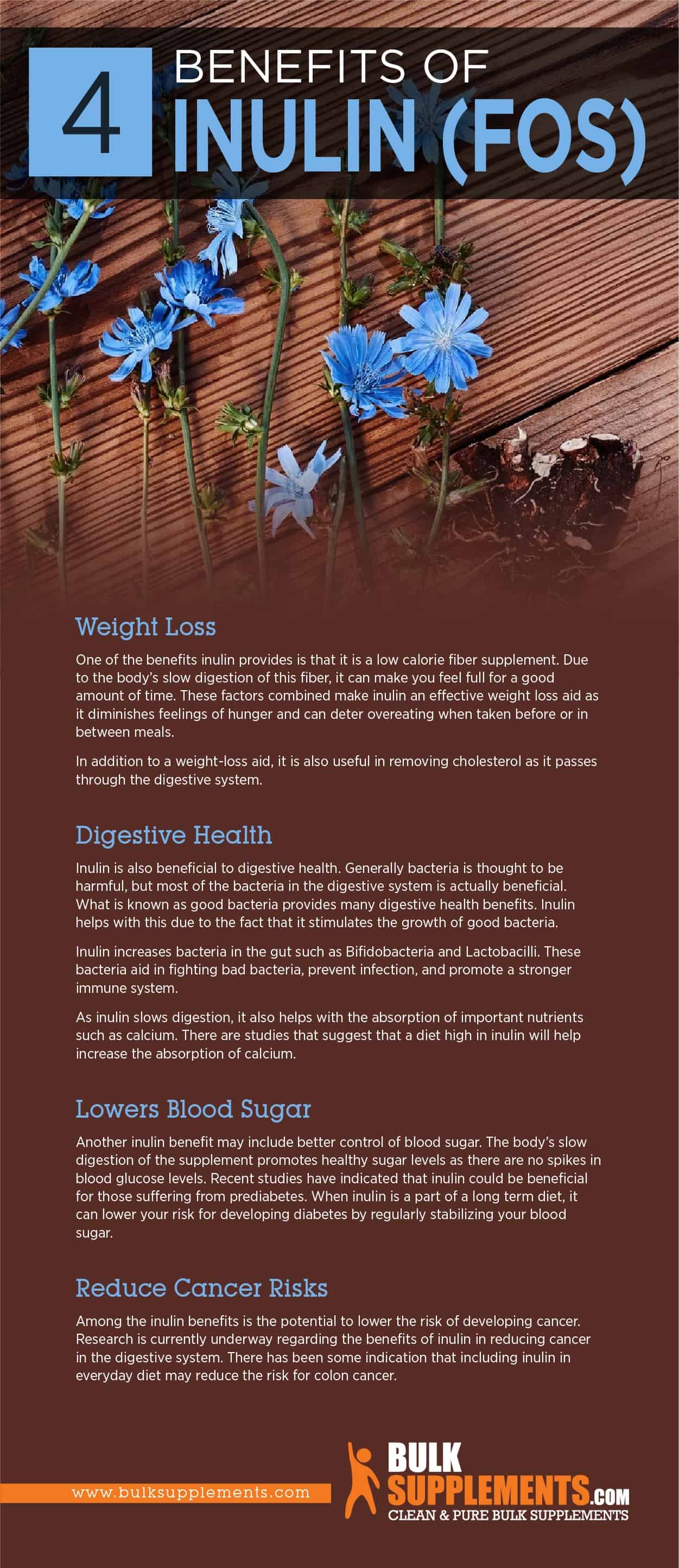Inulin (FOS): Benefits, Side Effects & Dosage
by James Denlinger Digital Marketing StrategistInulin is a form of soluble fiber found in a number of plants. This completely natural substance consists of fructose molecules that cannot be digested by the small intestine, therefore causing it to function as a prebiotic. The natural bacteria found in the lower gut converts inulin into fatty acids that provide a great many health benefits.
Studies have found that our early human ancestors had a diet of plants that contained a high level of inulin and that, on average, early humans consumed far higher amounts of it than they do today. Although inulin is not a required part of a healthy diet, consuming it on a regular basis can contribute to your daily fiber intake. People around the world are believed to consume inulin every single day in some form or another.
Some of the foods that naturally contain inulin include chicory root, artichokes, asparagus, bananas, wheat, and garlic to name a few. There are also several foods that contain added inulin such as margarine and salad dressings.
What Does FOS Mean?
Fructooligosaccharides (FOS), also referred to as oligofructose, is an oligosaccharide fructan. FOS is often used as an alternative sweetener. It occurs naturally in a number of foods and has become popular as a low-calorie replacement to sugar.
Inulin vs. Psyllium
As both are natural, plant-based starches and considered good additions to a healthy diet, inulin and psyllium share a lot of similarities. However, there are a few key differences to consider if you are looking to choose one over the other.
Psyllium is a soluble fiber and is the most common dietary fiber found in supplements. Psyllium can lower cholesterol and has been approved by the FDA for this use. Due to the fact that it does thicken quickly, it may not be as easy to add to your diet through drinks if you experience difficulty swallowing. Side effects that have been reported include bloating and other gastrointestinal discomfort.
Inulin is a soluble fiber that is also known as a prebiotic. Extracted from chicory root, it is not only a fiber supplement, but it is added to a number of products to boost the fiber content. Due to the fact that inulin is textureless, it is easy to incorporate into a variety of foods and is generally undetected. Unfortunately, the FDA has not yet approved it as an effective method of lowering cholesterol, though there are ongoing studies.
Inulin Benefits
Weight Loss
One of the benefits inulin provides is that it is a low calorie fiber supplement. Due to the body’s slow digestion of this fiber, it can make you feel full for a good amount of time. These factors combined make inulin an effective weight loss aid as it diminishes feelings of hunger and can deter overeating when taken before or in between meals.
In addition to a weight-loss aid, it is also useful in removing cholesterol as it passes through the digestive system.
Digestive Health
Inulin is also beneficial to digestive health. Generally bacteria is thought to be harmful, but most of the bacteria in the digestive system is actually beneficial. What is known as good bacteria provides many digestive health benefits. Inulin helps with this due to the fact that it stimulates the growth of good bacteria.
Inulin increases bacteria in the gut such as Bifidobacteria and Lactobacilli. These bacteria aid in fighting bad bacteria, prevent infection, and promote a stronger immune system.
As inulin slows digestion, it also helps with the absorption of important nutrients such as calcium. There are studies that suggest that a diet high in inulin will help increase the absorption of calcium.
Lowers Blood Sugar
Another inulin benefit may include better control of blood sugar. The body’s slow digestion of the supplement promotes healthy sugar levels as there are no spikes in blood glucose levels. Recent studies have indicated that inulin could be beneficial for those suffering from prediabetes. When inulin is a part of a long term diet, it can lower your risk for developing diabetes by regularly stabilizing your blood sugar.
Reduce Cancer Risks
Among the inulin benefits is the potential to lower the risk of developing cancer. Research is currently underway regarding the benefits of inulin in reducing cancer in the digestive system. There has been some indication that including inulin in the everyday diet may reduce the risk for colon cancer.
 PIN IT
PIN ITInulin Side Effects
Inulin is a natural element of the human diet and is considered safe. Although there is some potential for an allergic reaction, it is extremely unlikely.
Some of the side effects that have been reported with inulin include discomfort during bowel movements as well as loose stools. Some stomach cramping and bloating have also been reported. To correct this it is best to drink plenty of water. As most of these side effects appear when inulin is first introduced, these discomforts are likely to fade with regular usage.
Dosage
As a dietary supplement, it is recommend to take inulin powder in doses of 2600 mg one to three times daily with food or beverage. It is important to speak with your doctor before introducing any new supplements to your diet as they may recommend an alternative dosage. To avoid stomach upset, it is a good idea to begin with smaller doses.
The Bottom Line
Inulin powder is one of the most popular dietary fiber supplements available. The powdered form is easy to incorporate into the foods we eat daily. When it comes to side effects of dietary supplements, inulin is among one of the safest supplements. It can help you lose weight, as well as aid in the absorption of vital nutrients. As with any supplement, you should always speak with your doctor prior to adding inulin to your diet, especially if you are pregnant or on medication.
Sponsor Ads
Created on Mar 16th 2020 23:37. Viewed 342 times.




